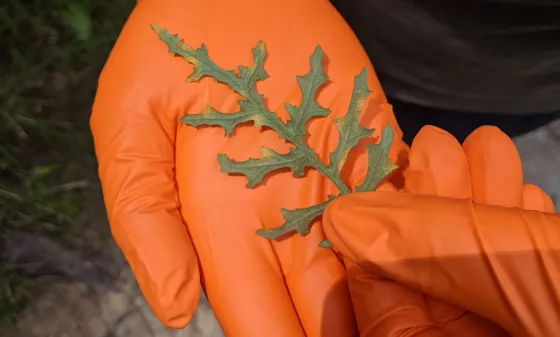PS PhD Exit Seminar: Microbiome dynamics during rust fungal infections
Plants don’t exist naturally in isolation. They are surrounded by, colonised by, and interact with, microorganisms.
Speakers
Event series
Content navigation
Description

Abstract: Plants don’t exist naturally in isolation. They are surrounded by, colonised by, and interact with, microorganisms. Plant microbiomes [BS1] have many reported benefits to their hosts, from directly suppressing pathogen infection to improving nutrient availability. Leveraging these benefits in an agricultural application is of great interest, particularly for protection against fungal pathogens which devastate crop yields.
Environmental DNA (eDNA) sequencing has opened new doors for profiling microbial communities, enabling molecular delineation of species with morphological similarities, or for which pure in vitro culture is not possible. Metabarcoding, using the 16S region for bacteria, or the internal transcribed spacer (ITS) region for fungi, can increase sample throughput, and identify many organisms simultaneously from a single sample.
I have developed and benchmarked a wet lab and bioinformatics workflow for using Oxford Nanopore Technologies long-read sequencing to profile microbial communities with metabarcodes. I present a novel multiplexing strategy to improve cost-effectiveness, and use an in silico mock community to demonstrate robust, species-level identification of fungi using long-read ITS sequences. I have then applied my knowledge from this benchmarking work to two leaf microbiome datasets: a sample set of rust fungus-infected wild grasses, and a sample set encompassing three spore stages of the wheat stripe rust fungus (Puccinia striiformis f. sp. tritici) across the sexual and asexual phases of its life cycle. I compare fungal and bacterial community composition and abundance across levels of infection status and host plant, to better understand how rust fungal infection influences microbiome community dynamics in the phyllosphere.
Biography: Abigail came to the ANU as a Summer Scholar in 2019, and has been with the Schwessinger Lab ever since. She began her PhD in 2021, a week before the ACT’s three-month COVID-19 lockdown. Abigail's principal research interest is how microbes, alone and together, respond to their environment, and the ways this influences the growth and health of their hosts. Her PhD project has sparked a broader interest in how DNA sequences are used to identify microbes, the current limitations, and how we might overcome them to better profile complex ecological interactions.
Location
Eucalyptus Seminar Room
S205, Level 2
RN Robertson Building (46)
There is also a Zoom link set up for the seminar -
https://anu.zoom.us/j/88631858736?pwd=4b5V12v1fpG1f45kAdexziJaRf4jza.1
Webinar ID - 886 3185 8736
Passcode - 109156
Time - Jun 20, 2025 01:00 PM Canberra, Melbourne, Sydney




